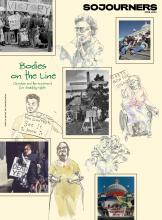Used with permission from Orbis Books (orbisbooks.com)
TO ITS CREDIT, the Black church seeks to instill a sense of “somebodyness” through positive reinforcement in conversion. But it seeks to do so without deeply immersing the convert in the true history of his/her culture. Consequently, the Black church falls prey to the universalism of the white church by naïvely thinking that one can be a true child of God while possessed of a deformed racial self-image. In so doing, the static conservatism of the Black church is at odds with freedom movements and prophetic leaders who are able to judge rightly that the freedom of Blacks cannot come through a rejection of one’s history, whether intentional or not.
Read the Full Article

